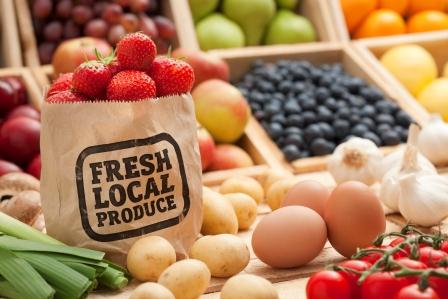
Home-grown seasonal food means fewer food miles and supports local economies
So much can be done in the kitchen to reduce waste and save resources, whether it’s plastic, water, electricity or food. Waste is just money, better spent elsewhere.
Here are Cookery School at Little Portland Street‘s top five practical tips to show you how easy it is to be more sustainable in your own kitchen.
1. Use upturned plates instead of cling film to cover containers in the fridge or invest in Pyrex containers with hard lids for storing food. Glass is inert so food does not react in it (cling film is said to release toxins when heated which could leach into food) and the containers last and last.
2. Buy local and seasonal ingredients so that food does not accumulate lots of air miles in the journey to reach our plates. It is often far less expensive, too, which is a nice bonus! Freezing surplus produce for use out of season instead of using imported out of season ingredients is also a good idea and does not reduce the nutritional value of the food either.
3. Eat a little less meat. Meat production causes a huge amount of greenhouse gas emissions so try to eat smaller portions and, when possible, try to stretch it by making stew and sausages thereby making a little meat go a long way. See the Meat Free Monday website for inspiration.
4. Eat well sourced fish – look for the MSC (Marine Stewardship Council) sign as that means that the fish that you are eating is not depleting our oceans so that they can be easily restocked. Line caught, local fish is best of all but fish that is brought in by boat from places not too far away is also fine.
5. People often don’t realise that they have a choice when it comes to the energy supplier they use at home. By switching to a renewable energy company such as Good Energy you can cut your carbon footprint by up to 50 per cent and they aren’t any more expensive than non-renewable sources.
Sustainability has always been at the heart of Cookery School at Little Portland Street’s ethos and this pervades all that they do, from the sourcing of ingredients and products to environmental issues like water and energy use, cleaning products and delivery schedules through to the way that they market their classes and courses and treat students and staff.
Cookery School at Little Portland Street even won an award in Looking to Cook’s 2014 UK Cookery School Awards, coming runners up to Daylesford in the Most Sustainable Cookery School category and they have the highest possible rating from the Sustainable Restaurants Association (SRA).
In keeping with their commitment to sustainability and in an effort to break down the misconception that being sustainable is difficult, arduous or downright hippy, Cookery School has created a module called Sustainable Kitchen that will form part of their six week long Cook’s Certificate in Food & Wine, accredited at Level 3 by OCN London. In the future, members of the public will be able to take the Sustainable Kitchen module as a standalone certificate so if you are interested in this, do get in touch with them.
